- Home
- Anne Hampson
The Dawn Steals Softly Page 2
The Dawn Steals Softly Read online
Page 2
'Magdalena,' interrupted Paula gently, 'I don't think you ought to be talking like this about Senor Calzada.'
'Oh, but everybody talks about him,' returned the maid, undaunted. She had a suitcase on a chair and was taking out some blouses and putting them on hangers. 'He is embittered and vengeful with women—you understand? And he is a rake now, but once he was a nice man.'
'You obviously heard all this as soon as you came here?'
'No. Senor Calzada is talked about everywhere.'
That must surely be an exaggeration, decided Paula, but she was frowning all the same. She had expected to be working for a highly-respected lawyer, and the noble owner of an estate. Well, he was certainly the owner of an estate, a vast one, but as for being highly-respected, that was obviously not the case. She said after a pause, 'I'm sure you are wrong when you say he's talked about everywhere.'
The girl gave a small shrug. 'Most people know about the affairs of Senor Calzada. He lives in San Juan most of the time and it is there that he has many lady friends.'
'San Juan?' Mrs. Glynn had not mentioned anything about his living in the capital… and yet she, Paula, ought to have surmised that he would be practising in the main city of the island, since most of the business would be conducted there.
He was waiting when she entered the saloon to which she had been conducted by Magdalena. Paula stood for a moment just inside the door, looking at him. It was easy to imagine his having numerous affairs, because he possessed just about everything a man could possess. He would stand out in any crowd, even among royalty, she thought, advancing now into the room as his eyes widened in pompous, urbane enquiry as if he were asking why she was standing there, staring at him. He was still dressed in the same white linen suit with the frilled shirt. His black hair, waving away from his forehead, shone, and the same healthy sheen was on his dark skin. She saw his eyes wander, found herself anxious that she was looking her very best. Her dress was new, an evening gown of crisp cotton, white with vivid red flowers and bright green leaves, a slashed neckline and short cap sleeves. His eyes became fixed on the tightness of the bodice where it contoured her breasts in seductive beauty; she coloured, because she could not help it, and something stirred within her. She glanced down at his slender brown hands… and wondered why.
'You are early,' was his prosaic remark, which seemed to break the spell in which she was being caught. A long breath was let out; she found herself deliberately thinking of Denis, as if he were a safety valve of which she must never lose sight.
'I am usually punctual,' she returned, trying to smile but failing to do so.
'Can I get you a drink?' Already he was striding over to a cabinet, every step portraying pride and arrogance. The strain was already beginning to tell and Paula wished with all her heart that she had not accepted the post without first meeting her prospective employer. It had been a stupid thing to do, but at the time she was so thrilled to be going to the West Indies that she lost sight of the more important side of the contract.
'Yes, please,' she returned quietly. 'I'll have a dry Martini.'
He poured it for her, standing over her as he handed her the glass… standing far too close for her comfort.
'We shall talk over dinner.' His voice was clipped and aloof, and authoritative. 'There is much to discuss.'
'Yes, of course.' She accepted the glass, then took possession of the chair he indicated. What a magnificent specimen he was! She could not take her eyes off him, and was furious with herself at being affected so strongly by his appearance. But there was something magnetic about his personality as well, and again she brought out the mental picture of Denis, just to get herself back to reality. For Denis was real, an ordinary young man, whereas this nobleman standing here was more like a god, unapproachable. 'Mrs. Glynn did tell me a good deal about the post but, as I told her, I've never worked for a lawyer before.'
'I have her report,' he said. 'She was in constant touch by telephone while the proceedings were going on.'
'I see. So you know all there is to know about me.'
At that the first faint glimmer of a smile broke the hard and haughty outline of his mouth.
'I know nothing about you,' he murmured, the brilliant eyes narrowing slightly. He was standing in the middle of the room, his glass half-raised to his lips. 'You will talk to me about yourself over dinner.'
She frowned up at him and said tautly, 'You mean about my work, senor.'
'I mean about you, senorita.' The glass reached his mouth and he sipped the sherry contained in it. 'You're a very beautiful woman, Miss Blake,' he added in English. 'Are you engaged—or keeping company perhaps?' His eyes strayed to her left hand. He spoke again before she had time to answer. 'No, you have no fiancé, since it is not conceivable that he would allow you to come here and work for another man.' The tone had changed, taking on an edge that was unmistakably harsh, and Paula knew for sure that he was remembering his own fiancée. What had she done to him? Paula wondered. 'You are blushing, senorita,' he observed, again affording her no time to speak. 'It is because I said you are beautiful. But surely other men have said the same to you?'
She glanced away, angry and confused that he would speak to her this way. She said abruptly, 'I have a young man friend, senor. He and I decided we wanted to see something of the world before settling down, so he went on a cruise ship as steward and I took this post.'
'It is only temporary?' he queried sharply, his dark brow knitting in a sudden frown.
'I shall be with you for at least two years—' She broke off, aware that she was not answering with the truth. For she was unsure of herself, of her staying power with a man who was so vastly different from what she had expected. True, Mrs. Glynn had warned her of his probable arrogance, but this man was a rake too, and hard. She had admitted that he was handsome—the most superlatively attractive man she had ever met—but she also saw in his aristocratic features a certain harshness, cruelty, even. She had no doubts that Ramon Calzada Gonzalez had something as cold and inflexible as granite where his heart should have been. Never could she imagine his knowing what pity and compassion meant. Nor could she see him gentle and loving. She thought of all those women Magdalena had spoken of, and came to the instant conclusion that he would take them heartlessly and without a trace of emotion. Playthings, and despised; thrown aside to make way for more of their kind. Paula felt sickened all at once and would have done anything to be somewhere else. She decided that, over dinner, she would let him see that she was in doubt about working for him. Yes, she had taken on the job and she would stay until he got someone else—
'You were saying, senorita?' His voice, commanding, cut her thoughts; she glanced up into his dark forbidding face. 'You are intending to stay at least two years?'
'I—I…' Her lips were dry and she licked them unconsciously. 'I ought to have come over and met with you before I made up my mind.'
The dark eyes widened, regarded Paula disconcertingly, then narrowed again.
'You've had a change of heart?' He seemed unable to comprehend such an eventuality and Paula found difficulty in suppressing a smile. This was obviously a blow to his ego!
'I rather think the job will be unsuitable to me.' She frowned inwardly, thinking of all she had given up to take this post. Her job was gone; her flat was let on a one-year lease with the option to the tenant of a further year. What an upheaval there would be if she decided to go home.
'You haven't tried the work,' was his brusque rejoinder. 'How can you say it will not suit you?'
She looked at him curiously.
'Will I suit you?' she said. 'I know that you relied on Mrs. Glynn to find someone who would meet with your approval, but you must have known, senor, that there was a risk.'
'You are thinking that I ought to have gone over to England myself, and conducted the interviews?'
She nodded her head; she saw his eyes become focused upon her and was aware that the movement had caused her hair to catch the glow from a w
all light just above the chair on which she was sitting.
'I feel it would have been better for us both.'
'You'd not have accepted the post had you met me before?'
She coloured and glanced away. She had tried to be tactful, but evidently he was not intending to do the same.
'I can't say for sure, senor,' she managed at last.
'Prevaricating? I am sure, Miss Blake,' he went on, reverting to English, 'that you would have refused to come and work for me.' A pause before he added, softly as if to himself, 'But, then, I rather think that I would never have offered you the post.'
Her eyes flew to his.
'You wouldn't?' she said.
'I have found that a beautiful girl is a pest,' he returned bluntly. 'Too many men run after her. I hope, Miss Blake, that you will let it be known that you are spoken for.'
They dined in a high-ceilinged room of elegant but moderate proportions, dined by the light of twenty or more candles, all set in Waterford crystal holders; the chandeliers—of which there were three—were also of Waterford. The silver cutlery on the table was Georgian, from England; the porcelain was Wedgewood.
'You have all these from England?' Paula had to remark as she sat down.
'In San Juan one can buy products from all over the world, including antiques,' he told her, picking up a carved wooden basket containing warm crispy bread rolls. 'Try one; my chef is an expert on breads—as on everything else.' He spoke matter-of-factly, as if he had been used to perfection, so long that he took it for granted and to be his right, she thought, accepting a roll and putting it on to her side-plate. She touched the petal of an orchid that was contained, with others, in a Regency cut-glass salt-cellar which had been used as a miniature flower vase and which was set beside her wine glass.
'I had no idea that Puerto Rico was so modern,' she said.
'You thought—like many misinformed people—that we are living in near poverty?'
'I did believe that there was a great deal of poverty,' she admitted.
'You will very soon realise just how wrong you were.'
'I might not stay,' she was forced to remind him, to which she received a dark frown as he said, 'You've signed a contract. I can keep you to it.' Implacable the tone; she felt, though, that he could do very little if she were to break that contract.
'I know, but I feel that you'd not want me to stay if I weren't happy.'
'Happy,' with a slight lift of one straight black eyebrow. 'I am not concerned with the happiness of my employees,' he added with unveiled indifference, as he took up his knife and began to butter his roll. 'It is sufficient that I pay more than is normal for any services rendered to me, and there my interest comes to an end.' His long slender fingers held the knife; Paula stared at them, fascinated for some reason she could not explain. She knew their slenderness and apparent delicacy was undoubtedly deceiving. 'I shall expect you to honour the contract you have signed,' he continued when she did not speak. 'You must at least give the work a trial.' There was something in his voice that dominated in the most subtle way. Paula knew she would have to submit to his will, to honour the contract she had so eagerly and unthinkingly signed.
Chapter Two
She was sitting in a shady arbour in the hacienda grounds, reading a letter received this morning from her mother, and redirected by the lessees of Paula's flat. It was over three months since Paula had written to her, telling her that she was contemplating taking a post somewhere abroad. The post of secretary to Senor Calzada had not come up at that time, and as yet Paula had not written to inform her mother of her change of work and residence; she had been awaiting an answer to her previous letter—and growing a little angry at the same time. For her mother was not one for writing, and to Paula that seemed selfish and unfair. She had been deprived of both father and mother when she was only eighteen because they had agreed to a divorce, each having met someone else. To Paula, who was a romantic and full of lovely ideals regarding the permanency of love and marriage, this had been little less than horrific. Bewilderment, unhappiness, insecurity… all had come with the suddenness of a summer storm and she had been torn apart, floundering, especially when her mother had said the home would be sold and she would find a nice little flat for her daughter. Within a couple of weeks of the divorce being made final, the second marriages were taking place. Paula was invited to both; she went to neither. Tears and more tears had been shed in the flat where she lived alone, her world crashed about her ears. But she possessed a certain strength and resilience which was bound to come to her aid in the end, and as she had a good post with the firm where she later worked as secretary to the managing director, she was eventually able to make some sort of a life for herself. She mixed with a crowd of young people and the mother of one insisted she enter the beauty contest which she had won. Confidence was the greatest profit, not the prize, but the prize came in handy too, as it bought some rather attractive pictures and ornaments for the flat. By the time she was twenty-one, Paula was happy in her independence, but she had never really forgiven her parents for the suddenness with which they had sprung their intentions upon her. She'd had no idea that they were interested in others, but she later extracted the information from her father that he had had another woman for over three years while his wife had been going out with someone else for about six months. Undoubtedly it was her father's conduct that had been responsible for her mother deciding to find someone else. Paula had never been considered by either of them.
And now, it was too much trouble for her mother to write regularly. Her father had written every month, but he had died just over a year ago, leaving everything to his wife. Although Paula had not wanted either his property or his money, she was bitter about being left out of the will. She ought to fight it, her friend's mother had advised wrathfully, but Paula had said no. Her father's wishes must be observed.
The letter was short, containing the news that her mother and stepfather were going to live in New Zealand.
'Perhaps, dear, you will visit us sometime,' was the vague invitation which disgusted Paula. 'I'll let you know our address as soon as I can, but we'll be busy, Paula, so don't be upset if there is some delay. However, we must keep in touch, mustn't we, dear?'
Keep in touch… What a thing for a mother to say to her daughter! Crumbling the single sheet of paper into a ball, she tossed it away. She must retrieve it later, she mused, not because she wanted it, but because she ought not to have thrown it there, among the African violets.
She dozed, and on waking up forgot all about the letter. She went towards the house, her thoughts on her employer, who had been working steadily on a case for the whole of the fortnight she had been with him. He was defending a motorist accused of killing a cyclist by dangerous driving, the district court judge who held the hearing having decided that cause existed for criminal prosecution. For Paula the work had been extremely interesting, something entirely new, but it had been difficult as well, as Ramon Calzada had proved to be a hard taskmaster, just as she had expected. But she felt certain that he was satisfied with her, and she was determined that he should continue to be satisfied.
Her thoughts switched from his work to his pleasure.
One evening a woman had arrived, driving a large car; she was about thirty years of age and possessed a dark, exotic beauty which, thought Paula, would appeal to any man. She was obviously of Latin American origin, but her eyes gave evidence of a hint of the Orient somewhere along the genetic line. Ramon had smiled thinly as he introduced the girl to Paula, and Paula decided that the woman had no pride to be treated with what amounted almost to indifference. Paula was not invited to dine with them, but she had not expected to be, since she had dined with her employer only twice—once on the first evening, and the second time a couple of nights later when he said he wanted to give her a full outline of what he was doing so that when she was typing the details of the case she would have a better understanding of it.
The woman, whose visit seem
ed to depress Paula in some indefinable way, had stayed the night, ostensibly occupying the guest suite, but Magdalena was quick to tell Paula that the bed, although ruffled, had not been slept in.
'The senor has a big double bed in his room,' she had added, before Paula, trying not to appear embarrassed, told the girl that she was not interested in the private affairs of the senor.
'Senorita Cuevas is his latest—what do you say? Flirt?'
'I've already said I am not interested, Magdalena!'
'Sorry, senorita! I won't do it again.'
Not until the next time, thought Paula grimly, wondering how she was going to stop the girl's tongue.
Paula had thought about Maria Cuevas a great deal since that night, finding it strange that she should come to Ramon, rather than that he should go to her. Was she so crazy about him that she must run after him? Surely her action amounted to nothing less than that. No wonder he had an inflated opinion of himself! What he wanted was a set-down—for some young lady to scorn his advances, to tell him that he was just not her type. Paula had to smile, for surely no woman breathing could say with honesty that Ramon Calzada did not attract her. As for Paula herself—she had to admit to his attraction, and she did have the greatest difficulty in ignoring it. Denis still served as her safety valve, and just so that she would not forget it she had brought a small frame for a snapshot she had once taken of him, and she now had this on her dressing-table.
Her thoughts reverted to the letter she had received and she turned, retracing her steps with the intention of picking it up from the bed of violets into which she had tossed it. It was not there, and she surmised it had been blown away by the breeze. But when she got back to the house the letter—having been straightened out—was handed to her by her employer. He was sitting on a marble terrace with the open window of the sitting-room behind him, and he looked totally relaxed. It was Saturday and he did not work on weekends unless it was vital.

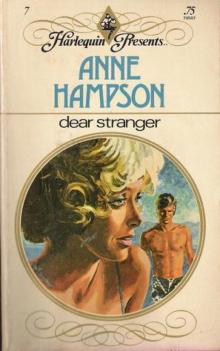 Dear Stranger
Dear Stranger Dangerous Friendship
Dangerous Friendship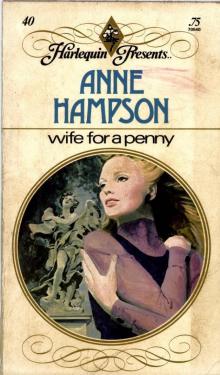 Wife for a Penny
Wife for a Penny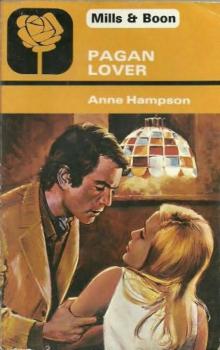 Pagan Lover
Pagan Lover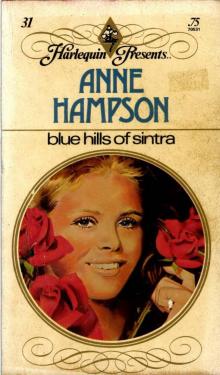 Blue Hills of Sintra
Blue Hills of Sintra After Sundown
After Sundown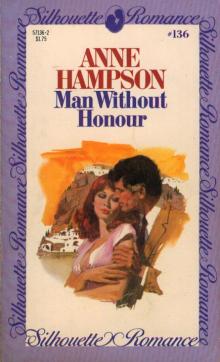 Man Without Honour
Man Without Honour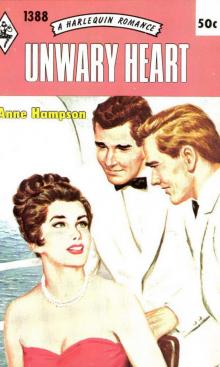 Unwary Heart
Unwary Heart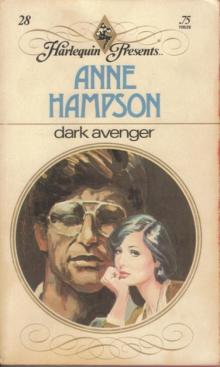 Dark Avenger
Dark Avenger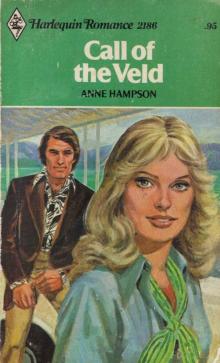 Anne Hampson - Call of The Veld
Anne Hampson - Call of The Veld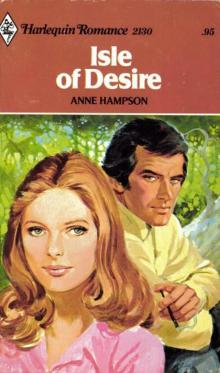 Isle of Desire
Isle of Desire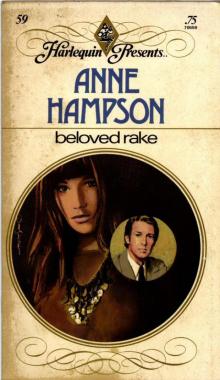 Beloved Rake
Beloved Rake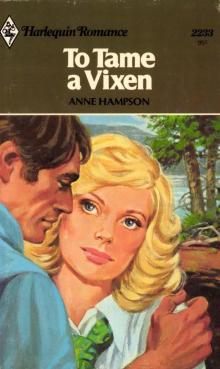 To Tame a Vixen
To Tame a Vixen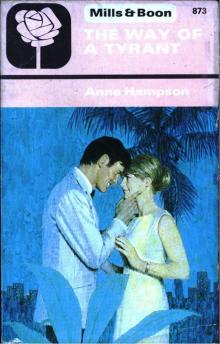 The Way of a Tyrant
The Way of a Tyrant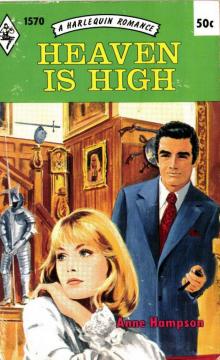 Heaven is High
Heaven is High A Kiss From Satan
A Kiss From Satan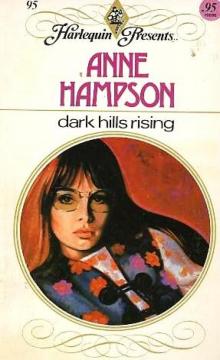 Dark Hills Rising
Dark Hills Rising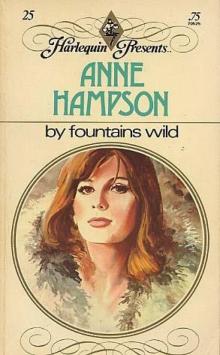 By Fountains Wild
By Fountains Wild Second Tomorrow
Second Tomorrow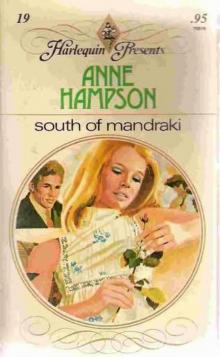 South of Mandraki
South of Mandraki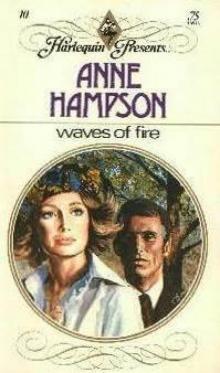 Waves of Fire
Waves of Fire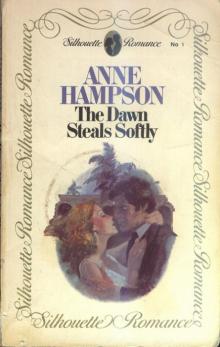 The Dawn Steals Softly
The Dawn Steals Softly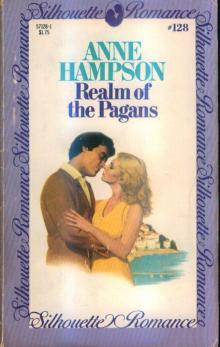 Realm of the Pagans
Realm of the Pagans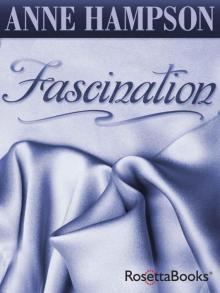 Fascination
Fascination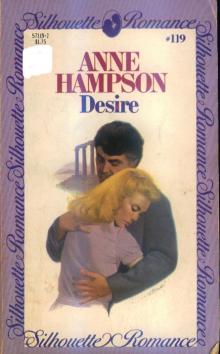 Desire
Desire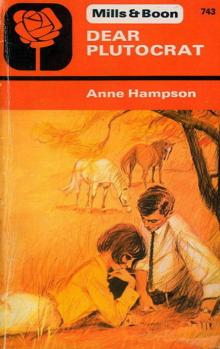 Dear Plutocrat
Dear Plutocrat Strangers May Marry
Strangers May Marry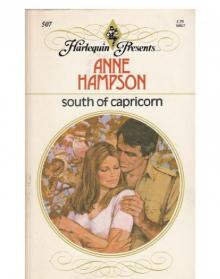 South of Capricorn
South of Capricorn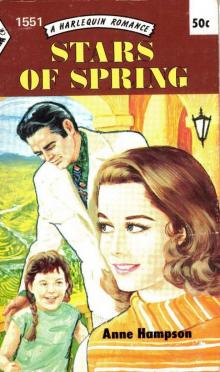 Stars of Spring
Stars of Spring Enchanted Dawn
Enchanted Dawn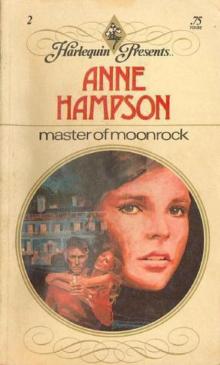 Master of Moonrock
Master of Moonrock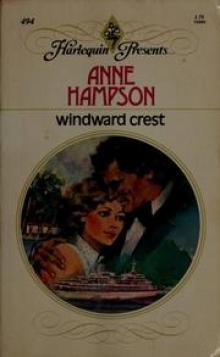 Windward Crest
Windward Crest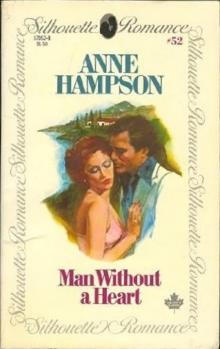 Man Without a Heart
Man Without a Heart